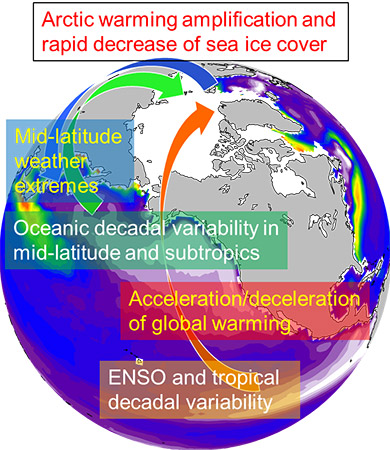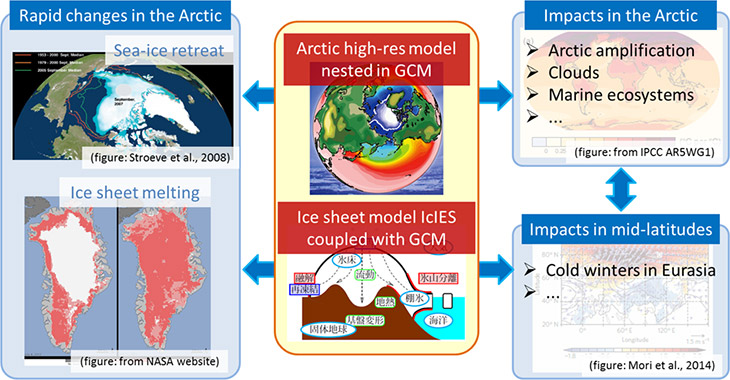Theme 5
Study on Arctic climate predictability

PI : Hiroyasu Hasumi (JAMSTEC)
Study Sites : Global, with a focus on the whole Arctic region
Background of the Research
It is being demonstrated that the Arctic environment is rapidly changing together with global warming, and that it also influences global climate variability. In order to know how the Arctic environment will change in the future, we need to reveal how the various factors in the Arctic environment, such as the atmosphere, the ocean, and the cryosphere, interact with one another. On the other hand, it is thought that understanding how the Arctic environment is linked to the climate at low and middle latitudes would lead to better predictability of the climate on seasonal to decadal time scales. Furthermore, for long-term projection of the climate on multidecadal time scales, we also need to precisely evaluate changes in the Arctic environment, as exemplified by the importance of sea level rise due to melting of the Greenland ice sheet.
Overview of the Research
The goal of our theme is to evaluate the predictability of Arctic-related climate variations, wherein we aim to: (1) establish the scientific basis of climate predictability; and (2) develop a method for predicting/projecting medium- and long-term climate variations.
Variability in the Arctic environment remotely influences middle latitudes, including our country, and also the whole world. Since some of the processes specific to the Arctic environment, such as those in the cryosphere, function as a long memory of the state of the climate, understanding the process of remote connections is expected to lead to higher-precision and longer-term prediction of global climate variations. Furthermore, the Arctic region is experiencing the largest changes in the context of the warming climate, and the changes in the cryosphere are deeply related to the acceleration of warming and irreversible changes in the global climate.
Numerical models are widely utilized for studies of the climate, but conventional climate models commonly have large uncertainty in the Arctic region. By making Arctic processes in climate models more sophisticated, we aim to clarify the role of multi-sphere interaction in the Arctic environment. We also aim to reveal the mechanism of remote connections between the Arctic environment and the global climate by conducting climate simulations with the climate models we develop, and by analyzing various types of climate datasets. Furthermore, we aim to predict variability and project changes in the Arctic environment on interannual to multidecadal time scales and assess their influences on the global climate by developing a method to assimilate observed data into climate models, developing a climate model with special high resolution in the Arctic region, and incorporating the ice sheet process in climate models.
In this theme, we conduct massive numerical experiments by utilizing state-of-the-art high-performance computers, such as the Earth Simulator of JAMSTEC.

Schematic for remote connections between the Arctic environment and the global climate

Schematic for long-term climate projection study
Cooperative Institutions / International Projects
World Climate Research Programme / Polar Climate Predictability Initiative (WCRP/PCPI), CMIP6/ISMIP6, APPOSITE
Implementation Structure
Members
| Name | Institutes |
|---|---|
| Hiroyasu Hasumi | JAMSTEC/The University of Tokyo |
| Yoshiki Komuro | JAMSTEC |
| Hiroaki Tatebe | JAMSTEC |
| Manabu Abe | JAMSTEC |
| Kazuya Kusahara | JAMSTEC |
| Jun Ono | JAMSTEC |
| Fuyuki Saito | JAMSTEC |
| Tomonori Sato | Hokkaido University |
| Tomohito Yamada | Hokkaido University |
| Teppei Yasunari | Hokkaido University |
| Koji Yamazaki | Hokkaido University |
| Tetsu Nakamura | Hokkaido University |
| Enkhbat Erdenebat | Hokkaido University |
| Yoshihiro Tomikawa | National Institute of Polar Research |
| Name | Institutes |
|---|---|
| Ayako Abe-Ouchi | The University of Tokyo |
| Masakazu Yoshimori | The University of Tokyo |
| Masaki Sato | The University of Tokyo |
| Yoshimasa Matsumura | The University of Tokyo |
| Takao Kawasaki | The University of Tokyo |
| Noriaki Kimura | The University of Tokyo |
| Ryota O'ishi | The University of Tokyo |
| Hiroyasu Kubokawa | The University of Tokyo |
| Takuro Aizawa | The University of Tokyo |
| Hisashi Nakamura | The University of Tokyo |
| Yu Kosaka | The University of Tokyo |
| Bunmei Taguchi | The University of Tokyo |
| Masato Mori | The University of Tokyo |
| Jinro Ukita | Niigata University |
| Meiji Honda | Niigata University |
Collaborators
| Name | Institutes |
|---|---|
| Kei Yoshimura | The University of Tokyo |
| Yoshihiro Tachibana | Mie University |
| Atsuyoshi Manda | Mie University |
| Kazuaki Nishii | Mie University |
| Koutarou Takaya | Kyoto Sangyo University |
| Name | Institutes |
|---|---|
| Toru Nozawa | Okayama University |
| Yasunobu Miyoshi | Kyushu University |
| Kazuaki Kawamoto | Nagasaki University |
| Masayoshi Ishii | Japan Meteorological Agency |
| Takahiro Toyoda | Japan Meteorological Agency |
ArCS Blog
- Attribution of cooling in the mid latitudes of winter Eurasian Continent (February 20, 2019)
- Investigate the Arctic region from the viewpoint of numerical models - participate the Polar inter-model comparison project - (January 24, 2019)
- Cold spell and Stratospheric sudden warming (January 22, 2019)
- Arctic sea-ice forecast of this summer has released (August 10, 2018)
- Arctic sea-ice forecast of this summer has released (July 06, 2017)
- Arctic sea-ice forecast of this summer has released (July 08, 2016)




